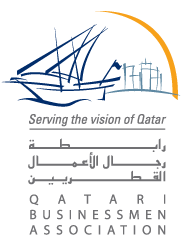The Global Competitiveness Report 2015-2016 Press Release
The Global Competitiveness Report, issued yearly by the World Economic Forum (WEF) has announced that the State of Qatar has been globally ranked 14 this year ahead of Saudi Arabia which is ranked 25, Kuwait 34, France 22, Belgium 19, Malaysia 18 and New Zealand 16
The Report also shows that Qatar led the Arabic and Gulf Countries by occupying rank 14 globally and first in the Arab World based on the methodology of the world economic forum which ranks 144 countries in three main phases covered in this report which are “Basic Requirements, Efficiency enhancers and finally the Innovation and sophistication”
According to the Study, The competitive strength of Qatar is due to the stable economic environment where it came in second place globally, as a result of lower public debt of the state and the high surpluses of the general budget, in addition to the presence of effective market goods where it came in the fifth rank globally as well as for the Security stability where it came in fourth place globally. The report also described the simplicity of funding in Qatar reaching the same global standards where Qatar occupies the first place in the world in regard to the accessibility to loans.
The report details the country’s economic profile for each of the 144 economies featured in the study, providing a comprehensive summary of the overall position in the Index rankings as well as a guide to what are considered to be the most prominent competitive advantages to each.
The Rankings are based on a combination of available hard data and the results of the Executive Opinion Survey, a comprehensive annual survey conducted by the World Economic Forum (WEF) together with its network of Partner Institutes in the countries covered by the report
the Qatari Businessmen Association (QBA) along with Qatar University, specifically the Social and Economic Research institute (SESRI)has been the local strategic partners of WEF in Qatar, where Throughout ten consecutive years, Qatari Businessmen Association worked with WEF to highlight the strengths of the local economy, especially with respect to the investment climate and opportunities in all areas. Where the two institutes had put massive efforts to distribute, follow up and collect the survey questionnaire, which is designed to capture a broad range of factors affecting the economy expressed by the views of the business community, and to deliver a comprehensive overview of the main strengths and weaknesses in the national economy
According to the report’s Global Competitiveness Index (GCI) 2015-2016, the United States remains the third (3) globally thanks to its institutional framework and innovation scores. Also remained Switzerland number 1 for the seventh consecutive year, Singapore remains second and Germany (4th) where Finland dropped to rank (8), Japan kept its (6th) rank, followed by Hong Kong SAR (7th) with its stable economy.
Also Netherlands raised its rank to reach the (5th) while the United Kingdom dropped one rank to reach the (10th) followed by Norway (11).
In Europe, Spain, Italy, Portugal and France have made significant strides in bolstering competitiveness. Thanks to reform packages aimed at improving the functioning of markets, Spain and Italy climb two and six places respectively. Similar improvements in the product and labour market in France (22nd) and Portugal (38th) are outweighed by a weakening performance in other areas. Greece stays in 81st place this year, based on data collected prior to the bailout in June. Access to finance remains a common threat to all economies and is the region’s greatest impediment to unlocking investment
Among the larger emerging markets, the trend is for the most part one of decline or stagnation. However, there are bright spots: India ends five years of decline with a spectacular 16-place jump to 55th. South Africa re-enters the top 50, progressing seven places to 49th. Elsewhere, macroeconomic instability and loss of trust in public institutions drag down Turkey (51st), as well as Brazil (75th), which posts one of the largest falls. China, holding steady at 28, remains by far the most competitive of this group of economies. However, its lack of progress moving up the ranking shows the challenges it faces in transitioning its economy
Among emerging and developing Asian economies, the competitiveness trends are mostly positive, despite the many challenges and profound intra-regional disparities. While China and most of the South-East Asian countries performing well, the South Asian countries and Mongolia (104th) continue to lag behind. The five largest members of the Association of Southeast Asian Nations (ASEAN) – Malaysia (18th, up two), Thailand (32nd, down one), Indonesia (37th, down three), the Philippines (47th, up five) and Vietnam (56th, up 12) – all rank in the top half of the overall GCI rankings.
The end of the commodity super cycle has strongly affected Latin America and the Caribbean, and is already having repercussions on growth in the region. Greater resilience against future economic shocks will require further reform and investment in infrastructure, skills and innovation. Chile (35th) continues to lead the regional rankings and is closely followed by Panama (50th) and Costa Rica (52nd). Two large economies in the region, Colombia and Mexico, improve to 61th and 57th, respectively
It’s a mixed picture in the Middle East and North Africa. Qatar (14th) leads the region, ahead of the United Arab Emirates (17th), although it remains more at risk than its neighbour to continued low energy prices, as its economy is less diversified. These strong performances contrast starkly with countries in North Africa, where the highest placed country is Morocco (72nd), and the Levant, which is led by Jordan (64th). With geopolitical conflict and terrorism threatening to take an even bigger toll, countries in the region must focus on reforming the business environment and strengthening the private sector.
Sub-Saharan Africa continues to grow close to 5%, but competitiveness and productivity remain low. This is something countries in the region will have to work on, especially as they face volatile commodity prices, closer scrutiny from international investors and population growth. Mauritius remains the region’s most competitive economy (46th), closely followed by South Africa (49th) and Rwanda (58th). Côte d'Ivoire (91st) and Ethiopia (109th) excel as this year’s largest improvers in the region overall.
This year’s edition found a correlation between highly competitive countries and those that have either withstood the global economic crisis or made a swift recovery from it. The failure, particularly by emerging markets, to improve competitiveness since the recession suggests future shocks to the global economy could have deep and protracted consequences.
The report’s Global Competitiveness Index (GCI) also finds a close link between competitiveness and an economy’s ability to nurture, attract, leverage and support talent. The top-ranking countries all fare well in this regard. But in many countries, too few people have access to high-quality education and training, and labor markets are not flexible enough.




